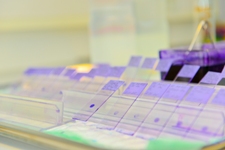Pneumonia - acute lung injury

Acute infections of the lower airways represent a growing health problem throughout the world. The mortality rate here has not, like other infectious diseases, declined over the past 50 years. Particularly the lack of pharmacological treatment options at the acute lung failure stage (ARDS, acute respiratory distress syndrome), the most devastating clinical course of pulmonary infectious diseases, emphasizes the research need for effective therapeutic measures.
The body’s own defense mechanisms must be very effective to protect the extremely vulnerable alveolar air space against pathogens. In this phase, the body must however find a balance between the infection defense and safeguarding the organ structures and functions like, for example, the continuous and vital gas exchange.
Failure of the local containment of pulmonary infections and inflammation could be the cause of the development of ARDS and the progression of invasive and systemic courses of disease.
Despite a large number of clinical studies with ARDS patients, up to now no valid predictors or effective pharmacological treatment for ARDS have been developed. Similarly, it has not yet been possible to bring pulmonary infections and inflammation under control.
In this field, the DZL research groups have shed light on the central mechanisms of inflammatory cell defense in pneumonia and ARDS. BREATH makes important contributions to the solution of the protective immune response of the lung to bacterial pathogens.
Furthermore, BREATH has identified basophils to be the cellular adjuvant which enhances the second immune reaction of the intact protein antigens. Prof. Dr. Tobias Welte is the Chairman of the German Competence Network for community acquired pneumonia (CAPNETZ), founded by the BMBF, which is the largest prospective control study on CAP worldwide. In this study up to now, biomaterial from more than 10.000 CAP patients has been collected.